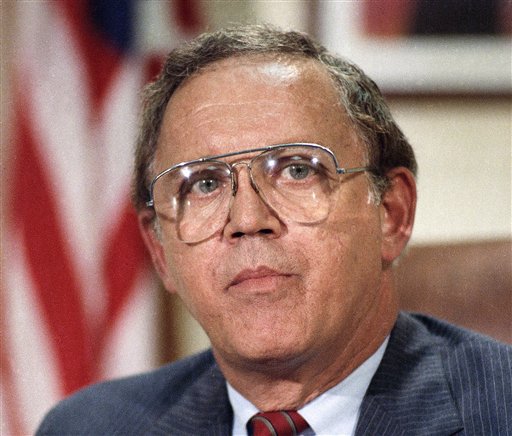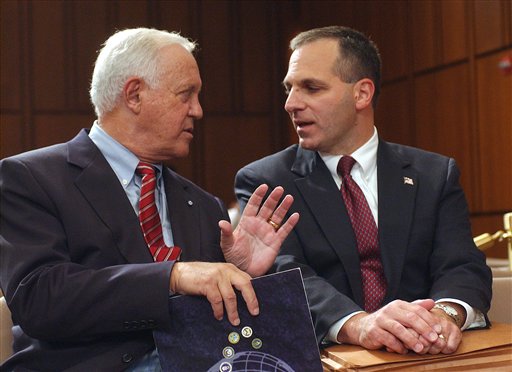CONCORD, N.H. — Colleagues knew former Sen. Warren B. Rudman for his abrupt manner, but they trusted his expertise. On one matter in particular, though, he wished people would have listened to him: that the U.S. was vulnerable to a major terrorist attack.
Rudman, 82, left the Senate in the early 1990s but later led a commission that predicted the danger of terrorism on American soil just months before the attacks of Sept. 11 and called for the creation of a Department of Homeland Security.
“No one seemed to take it seriously, and no one in the media seemed to care,” Rudman said in 2007. “The report went into a dustbin in the White House.”
Rudman, who also co-authored a groundbreaking budget balancing law and championed ethics, died just before midnight Monday at a Washington, D.C., hospital of complications from lymphoma, said Bob Stevenson, a friend and spokesman.
Rep. Charlie Bass of New Hampshire didn’t serve with him, but looked up to Rudman.
“He’d say, ‘Vote the tough way,’ and he’d say, ‘Don’t let people push you around,’ ” Bass recalled. ” ‘If you know what’s right, vote the way that’s right, and if you’re forceful and persuasive and sure of yourself, people will support you even if they don’t agree with you.’ “
President Barack Obama pointed to Rudman’s early advocacy for fiscal responsibility in mourning the passing of “one of our country’s great public servants.”
“And as we work together to address the fiscal challenges of our time, leaders on both sides of the aisle would be well served to follow Warren’s example of common-sense bipartisanship,” he said in a statement Tuesday.
Stevenson acknowledged Rudman could be abrupt, but said his peers respected him because he did his homework and was true to his word.
“He was a bulldog in the Senate. He set the standard for independence,” he said.
The feisty New Hampshire Republican went to the Senate in 1981 with a reputation as a tough prosecutor, and was called on by Senate leaders and presidents of both parties to tackle tough assignments.
He is perhaps best known from his Senate years as co-sponsor of the Gramm-Rudman-Hollings budget-cutting law. He left the Senate in 1993, saying the law never reached its potential because Congress and presidents Ronald Reagan and George H.W. Bush played politics instead of insisting on spending cuts.
“People are willing to risk their lives for their country in times of war,” he said at the time. “They ought to be able to risk an election in a time of economic trouble.”
Rudman “always had the national good in mind,” said former U.S. Sen. Ernest “Fritz” Hollings, of South Carolina. “He wasn’t extreme one way or the other, except for the good of the country. He was balanced. That’s what we need.”
In 2001, before the 9/11 attacks, he co-authored a report on national security with former Sen. Gary Hart of Colorado that said a major terrorist attack on American soil was likely within 25 years.
It was revived after the Sept. 11 attacks, and one suggestion, forming Homeland Security, was adopted. Six years later, Rudman said the sprawling department wasn’t functioning well and the country would be hit again.
“It is not a question, I’m sorry to tell you, of ‘if.’ It’s a question of ‘when,’ ” Rudman said.
A former New Hampshire attorney general, Rudman was named chairman of the Senate Ethics Committee in 1985, a sensitive job that many colleagues avoided.
Throughout his Senate career, Rudman was cited for his work on the Defense Appropriations subcommittee, where he supported a strong national defense but opposed expensive, high-tech weaponry.
The Gramm-Rudman-Hollings Act was approved in 1985. It was designed to end federal deficits by 1991 and required automatic spending cuts if annual deficit targets were missed.
Congress rolled back the timetable each year, and the 1991 budget that was supposed to be balanced carried the second-highest deficit in history. In 1995, 10 years after the law went on the books, Rudman lamented what could have been.
Send questions/comments to the editors.




Success. Please wait for the page to reload. If the page does not reload within 5 seconds, please refresh the page.
Enter your email and password to access comments.
Hi, to comment on stories you must . This profile is in addition to your subscription and website login.
Already have a commenting profile? .
Invalid username/password.
Please check your email to confirm and complete your registration.
Only subscribers are eligible to post comments. Please subscribe or login first for digital access. Here’s why.
Use the form below to reset your password. When you've submitted your account email, we will send an email with a reset code.